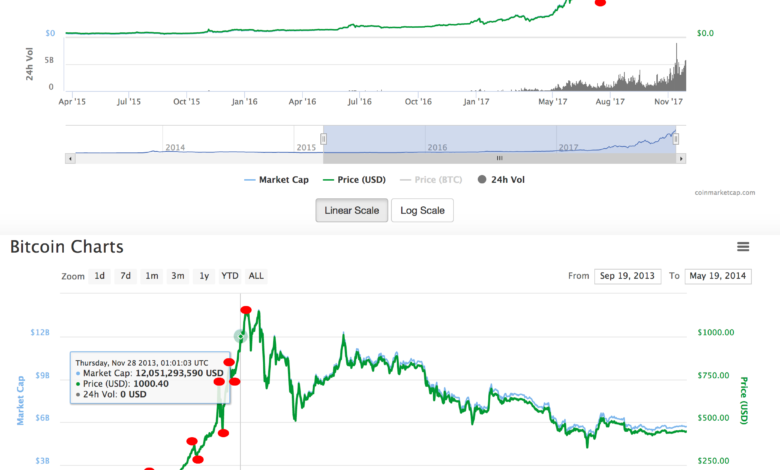Bitcoin Rally: How Yuan Devaluation Sparks Capital Flight

The recent Bitcoin rally is gaining traction as investors react to significant economic shifts, particularly the devaluation of the yuan. Arthur Hayes, renowned for his insights on cryptocurrency markets, warns that capital flight out of China could catalyze a surge in Bitcoin’s value. With the yuan’s decline amplifying concerns over China’s currency policy, many are looking to Bitcoin as a safe haven amidst uncertainty. According to Hayes, this pattern has been observed historically, and the current climate suggests a repeat could occur. As speculation on Bitcoin price predictions grows, the pressure on China’s economy underscores the potential for substantial gains in the crypto market.
As we delve deeper into the dynamics influencing the cryptocurrency landscape, it’s vital to consider how shifts in major economies affect digital assets. The decline of the Chinese yuan opens the door for investors to seek refuge in Bitcoin, a popular alternative investment. With increased capital flight from China, many analysts predict a bullish trend for Bitcoin, driven by rising demand and speculation on future price movements. Arthur Hayes emphasizes that this scenario is reminiscent of past instances where currency devaluation prompted a significant influx into cryptocurrency. Consequently, understanding the relationship between Chinese economic policies and Bitcoin’s market trajectory is essential for investors eager to navigate these turbulent waters.
Impact of Yuan Devaluation on Bitcoin Market
Arthur Hayes has asserted that the recent devaluation of the yuan could lead to a significant movement of capital into bitcoin. This phenomenon is not only crucial for investors but also indicative of larger economic trends triggered by China’s monetary policies. As the yuan weakens, especially with the exchange rate soaring to alarming levels, investors may seek safer assets, directing their funds towards bitcoin. This capital flight could potentially ignite a bitcoin rally, rejuvenating sentiments around its performance in the financial markets.
Furthermore, the implications of this capital flight extend beyond mere price movements. Historical patterns suggest that every time the yuan has faced substantial devaluation, there has been a noticeable influx into the bitcoin market, mirroring increasing confidence in cryptocurrencies as a secure store of value. With economies continuing to face uncertainty, particularly regarding China’s currency policy, Hayes’ insights resonate, emphasizing the need for investors to stay vigilant. Investing in bitcoin could soon become a necessity rather than a choice for many.
China’s Currency Policy and Global Trade Dynamics
China’s recent currency policy adjustments signal a significant shift in its economic strategy, potentially affecting global trade dynamics substantially. The country’s acceptance of a declining yuan may stem from increasing trade tensions with the U.S., particularly after the announcement of high tariffs on Chinese imports. Such measures are likely to increase competitiveness for Chinese exports but may equally lead to instability, inviting speculation and uncertainty among investors worldwide.
As this scenario unfolds, the impact of China’s yuan devaluation extends beyond its shores, affecting international markets and influencing foreign investments. If capital continues to flee from the yuan, it may bolster the narrative that assets like bitcoin could serve as safe havens. This idea aligns with Hayes’ predictions that emphasize a reactionary shift in capital flow into cryptocurrencies, which may very likely rise amid ongoing geopolitical tensions and monetary policy adaptations from global superpowers.
The Correlation Between China’s Market and Bitcoin Prices and Trading Trends
Arthur Hayes identifies a robust correlation between shifts in China’s market and fluctuations in bitcoin prices, positioning digital assets as a responsive alternative for investors amid economic uncertainty. As evidenced historically, there’s a pattern of increased bitcoin trading activity corresponding with Chinese currency devaluation. This trend occurs because investors often view cryptocurrencies as a hedge against local currency depreciation, driving demand for bitcoin as a refuge from fiat instability.
Additionally, the interdependence between Chinese investors and the cryptocurrency market suggests that as more individuals in China anticipate the yuan’s decline, they are likely to increase their investments in bitcoin. This leads to enhanced trading volumes and can escalate price movements, positioning the cryptocurrency market as an exciting arena for speculative trading. Hence, how China’s economic landscape evolves will be pivotal in shaping global crypto trends.
Arthur Hayes and His Predictions for Bitcoin’s Future
Since the inception of bitcoin, Arthur Hayes has emerged as a pivotal figure within the cryptocurrency community, known for his accurate forecasts and market analysis. His recent assertions regarding the yuan’s depreciation signal a profound optimism for bitcoin’s potential surges. By linking the economic indicators from China’s policies to the anticipated bull run for bitcoin, Hayes points out how macroeconomic factors can dramatically spell change for digital currencies. Investors should take note of his insightful commentary as they navigate the complexities of a rapidly evolving market.
Hayes’ track record draws attention to his ability to decipher market signals and predict trends effectively. He emphasizes that ignoring the potential impacts of China’s currency fluctuations could lead to missed opportunities in the bitcoin market. Observers should prepare for a possible cyclical resurgence in bitcoin’s value, driven by capital outflows from China as investors seek refuge in digital assets. With each market analysis, Hayes fortifies the importance of understanding global economic shifts in predicting cryptocurrency performance.
Bitcoin Price Predictions in the Wake of Global Economic Changes
Amidst the backdrop of fluctuating currencies and intricate trade dynamics, price predictions for bitcoin have gained considerable traction. Analysts, including Arthur Hayes, suggest that as capital escapes from depreciating currencies like the yuan, bitcoin may be on the verge of a significant breakout. Price forecasts must take into account ongoing geopolitical tensions, particularly between the U.S. and China, which may lead to volatile trading environments conducive to sudden spikes in crypto valuations.
Moreover, the interplay between these economic shifts and investor sentiment will be crucial in defining bitcoin’s price trajectory. As China’s policies evolve and the yuan faces further devaluation, engagement with bitcoin could rise significantly. Continuous monitoring of these developments is essential, as they will impact not only bitcoin’s immediate value but also its long-term adoption as a mainstream financial instrument among global investors.
The Role of Capital Flight in Bitcoin Demand
Capital flight triggers significant shifts in market dynamics and is often a precursor to massive trends in asset allocation. As citizens and businesses divert their funds away from traditional banking systems amid currency devaluation, the demand for alternatives like bitcoin increases. Arthur Hayes believes this movement plays a critical role in catalyzing bitcoin’s price movements, especially concerning historical precedents where similar trends resulted in substantial rallies.
The ramifications of capital flight are particularly poignant when considering the current environment in China, where economic pressures compel individuals to seek safer, more reliable assets. The strategic shift from fiat to digital currencies also serves as a reflection of broader dissatisfaction with traditional financial structures, further validating bitcoin’s growing influence as a viable asset class. As this trend continues, the interplay between capital flows and bitcoin demand will likely dictate future investment strategies.
Global Implications of China’s Yuan Devaluation
The international landscape is undeniably influenced by China’s currency value, and significant shifts can have far-reaching implications for the global economy. As the yuan weakens, countries with substantial trade ties to China are likely to feel the effects, potentially leading to adjustments in their own monetary policies. This chain reaction can cause volatility across different asset classes, including currencies and commodities, while simultaneously elevating bitcoin’s status as an alternative investment.
Additionally, as global investors start to react to the yuan’s devaluation, a broader trend may materialize where more capital seeks refuge in bitcoin. This dynamic could further cement the cryptocurrency’s role in the global financial ecosystem, positioning it as an asset that can hedge against traditional market risks and currency fluctuations. Observers should bear in mind that these global interdependencies will likely shape market sentiments around bitcoin.
Historical Context and Trends in Bitcoin Movements
Historically, bitcoin has demonstrated a robust reaction to macroeconomic changes, particularly those related to currency valuations. Arthur Hayes’ insights draw on this narrative, suggesting that prior instances of yuan devaluation have consistently correlated with rising bitcoin prices. Observing these patterns allows investors to anticipate possible futures, marking bitcoin not only as a speculative asset but as a foundational element in a changing global economy.
Understanding the historical context further reinforces the potential of bitcoin during periods of economic instability. Each devaluation or shift in currency policy has led to patterns of capital moving towards bitcoin, amplifying its correlation with global economic events. As such, investors should remain informed about these historical references, as they can prove invaluable in predicting future market behavior and Bitcoin price predictions.
Navigating Market Complexity: Investing in Bitcoin Resilience
Investing in bitcoin involves navigating a complex landscape influenced by myriad factors, including shifting monetary policies and economic conditions. As articulated by experts like Arthur Hayes, understanding these dynamics is crucial for making informed investment decisions. In today’s context, where the yuan’s devaluation could trigger significant capital movements, the resilience of bitcoin as a financial asset is progressively being tested and validated.
Moreover, in such a convoluted environment, investor strategy will play a substantial role in the future of cryptocurrency investments. Those who remain agile and informed about market conditions may find opportunities in the evolving narrative of digital currencies like bitcoin. As the interplay between global economic factors and local currency policies continues to unfold, it will be paramount for investors to stake their claims on adaptable strategies that leverage both the risks and rewards of embracing bitcoin.
Frequently Asked Questions
How could a yuan devaluation trigger a Bitcoin rally?
A yuan devaluation might lead to a significant capital flight to Bitcoin as investors seek refuge from a weakening currency. Historically, when the Chinese yuan depreciates, it has prompted investors to divert their funds into Bitcoin, anticipating that digital assets may provide a hedge against inflation and currency instability.
What is Arthur Hayes’ Bitcoin price prediction in relation to Yuan devaluation?
Arthur Hayes predicts that the yuan’s recent devaluation could spark a substantial Bitcoin rally. He believes that the downtrend in the yuan, which was allowed to fall below 7.20 to the dollar, will encourage capital to flow into Bitcoin, potentially pushing its price to new heights similar to previous years like 2013 and 2015.
How does China’s currency policy affect the Bitcoin market?
China’s currency policy, especially with the devaluation of the yuan, heavily influences the Bitcoin market. As the yuan depreciates, investors often seek to hedge against this economic instability by investing in Bitcoin, which could lead to an increase in demand and a subsequent rally in Bitcoin prices.
What role does capital flight to Bitcoin play during economic uncertainty?
Capital flight to Bitcoin typically occurs during periods of economic uncertainty, such as a devaluation of the yuan. Investors view Bitcoin as a safe haven asset that can mitigate losses associated with traditional currency fluctuations. As more capital exits unstable markets like China’s, demand for Bitcoin may rise, potentially triggering a rally.
Why should investors pay attention to Arthur Hayes’ analysis on Bitcoin and Yuan devaluation?
Investors should consider Arthur Hayes’ analysis as he has a track record of linking macroeconomic trends, like the yuan devaluation and capital flight, with movements in Bitcoin prices. His insights suggest that such economic shifts may create favorable conditions for a Bitcoin rally, making it essential for investors to stay informed.
What historical patterns support Arthur Hayes’ prediction about capital flight to Bitcoin?
Historical patterns indicate that during prior instances of Chinese yuan devaluation—specifically in 2013 and 2015—there was a noticeable capital flight into Bitcoin. These events often led to significant price increases in Bitcoin, suggesting a potential repeat of this trend amid the current economic conditions.
How does rising trade tension between the US and China influence Bitcoin’s price?
Rising trade tensions between the US and China heighten economic uncertainty, prompting capital flight into Bitcoin. As tariffs increase and curtail trade, the Chinese yuan may weaken further, driving more investors to Bitcoin, which they perceive as a stable asset during turbulent times.
What is the significance of Arthur Hayes’ statement, ‘Ignore China at your own peril’?
Arthur Hayes’ statement emphasizes the critical impact of China’s economic policies on global markets, particularly Bitcoin. By highlighting the urgency of recognizing these trends, he suggests that sidelining developments in China could lead to missed opportunities for investors looking to leverage Bitcoin’s response to monetary shifts.
| Key Point | Details |
|---|---|
| Arthur Hayes’ Prediction | China’s yuan devaluation may lead to increased capital inflows into Bitcoin, potentially igniting a historic bull run. |
| USDCNH Exchange Rate | The offshore yuan exchange rate surged to 7.3472, indicating a depreciation of the yuan. |
| Role of PBOC | The People’s Bank of China may act as a catalyst for a crypto rally as the yuan declines. |
| Policy Shift | The yuan fell below 7.20 for the first time since September 2023, signaling a willingness for depreciation. |
| Implication of Yuan Devaluation | Hayes believes capital flight from China will boost Bitcoin demand, as seen in historical instances. |
| Increasing Trade Tensions | The U.S. has imposed tariffs on Chinese imports, escalating economic confrontations. |
Summary
The Bitcoin rally may be on the horizon as Arthur Hayes predicts that the devaluation of the yuan could lead to a significant influx of capital into Bitcoin. The implications of China’s monetary policy shifts indicate that investors may seek refuge in digital assets like Bitcoin, driving up demand and potentially initiating a bull market. With historical trends supporting this theory, such as previous instances of capital flowing into Bitcoin during times of yuan depreciation, the market should keep a close eye on further developments amid rising trade tensions between the U.S. and China.




